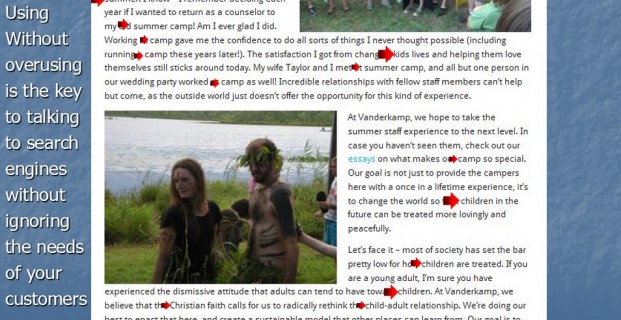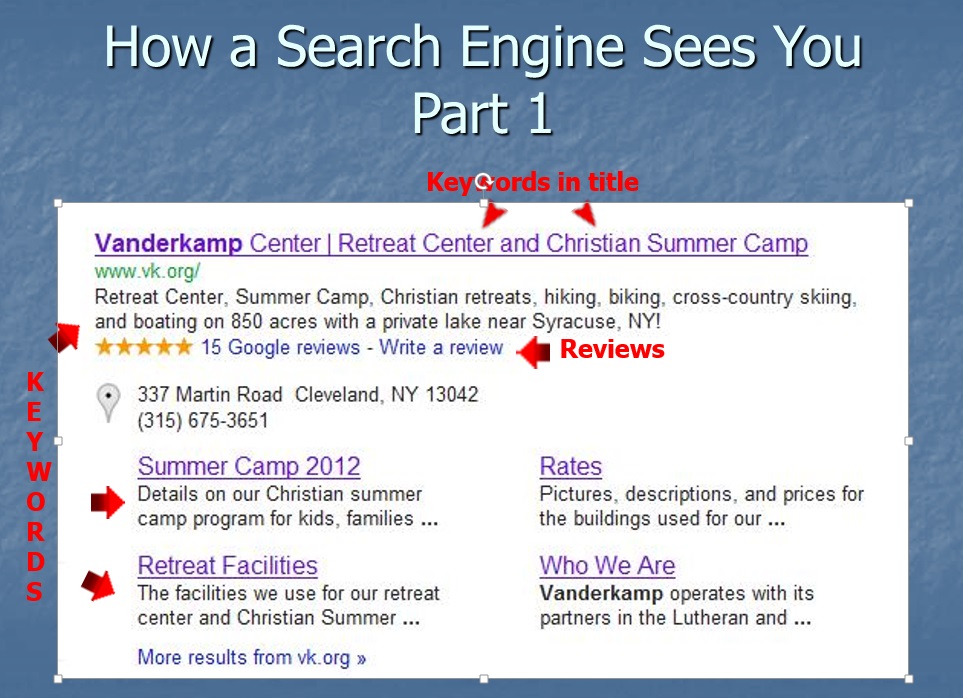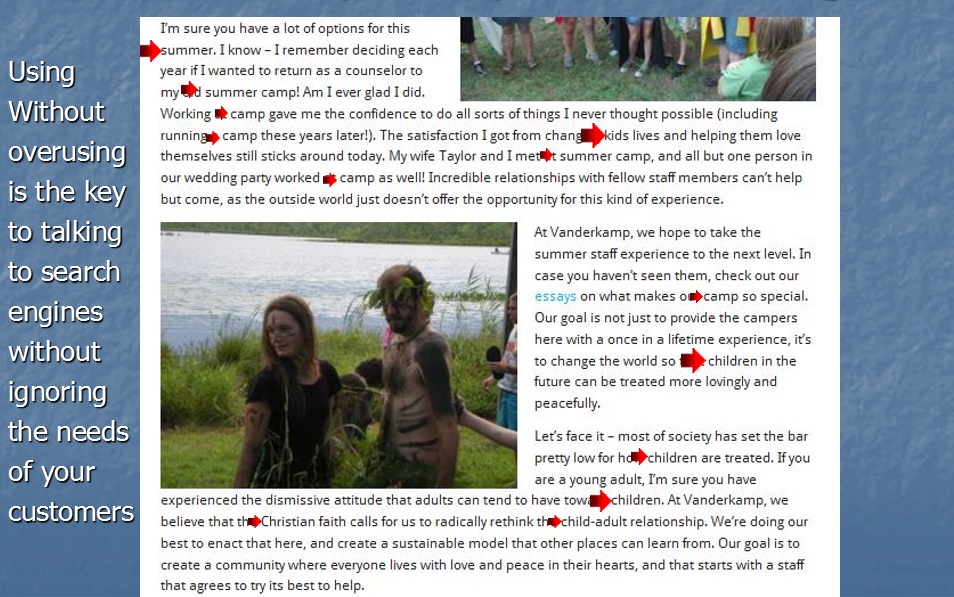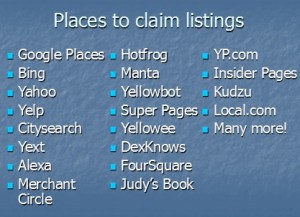Mobilizing your camp website for maximum marketing impact
Let me bring you back to my own brain in 2011, when I sat down to design a website for the first time. Our camp was broke, but our website was both outdated and difficult to update (since I had to work with someone else to do it). I was overwhelmed, plain and simple. The idea of creating a website sounded like something that had to be either A) incredibly expensive, or B) done by people much more technical than I was.
But, we didn’t have options. So I had to learn. Thankfully, there was someone to hold my hand through the first few steps. And he was wise enough to get me set up with something that was decidedly NOT technical.
So, while this post could be 100,000 words (and I might do follow-ups on this at some point, if people are interested), I am going to try and pare it down as simply as possible – and walk you through how you can set up a new camp website for yourself in a week of hard work.
And first, I just want to say – a new website changed the directory of our camp more than the rest of the things we have done, combined. That’s not hyperbole. We get more leads and conversions on summer camp sales through our new and improved website (replete with Search Engine Optimization techniques, which we’ll get to), than any other form of referrals, including word of mouth.
The very first steps toward your new website
Okay, you’re feeling scared and skeptical. If you’re feeling REALLY scared and skeptical, and you don’t think you’ll ever do this, no problem. You can hire me to do it for a heck of a lot less than you pay a traditional developer, and you can rest assured that you have someone who really knows camp. I only make websites for folks that they can fully run themselves after the fact, recognizing that occasional customer support will be necessary to get them out of a pickle here or there. Here are a few websites I’ve built: Vanderkamp Center, A Daily Fantasy Sports Website, and of course, this website right here. You can contact me if you have any interest.
But for the bold? You’re ready to get cracking. Awesome! Let’s do it.
The first thing I’d do if I were starting a new website from scratch is decide on a VERY easy to use content management platform. A content management platform is a fancy way of saying “something like WordPress.” A user-friendly interface that allows you to make posts, add images, update calendars, and so on, so you don’t have to pay someone every time you change the littlest thing on your website.
An easy to use content management platform is essential to continued success online. If your website is hard to use, you won’t update it as frequently as you should, and you’ll miss out on precious campers that could go to your camp this summer, but wind up doing something else.
I personally use WordPress on all the websites I make because it’s both powerful and easy to use. You can also use Squarespace, which has a really user-friendly interface and some gorgeous themes. The folks at Camping Coast to Coast use Squarespace, and their website is dynamite. So, I recommend looking into that if you like the look and feel of their sites.
I am going to focus today on getting a new website set up as soon as possible using WordPress.
Creating a new summer camp website from scratch using WordPress.
I could try and walk you through every single step, but it’s done very well elsewhere. I like this guide here: A Quick Tutorial on How to Create a WordPress Website. I can sign off on his recommendation of hosting with Bluehost, as well.
Optimizing your website for search traffic
After you’ve chosen a content management platform, you’ll want to consider optimizing your website for search engines like Google, Bing!, etc. I can’t stress enough how important this is. The difference between being on the first page of Google results for a term like “Summer camp in YOUR LOCATION HERE” vs. the 4th page is the different between generating several leads per day and generating 0. A fair warning, though – there are a lot of snake oil salesmen in the world who will try and guarantee you better search results, fast. There is no silver bullet for search engine optimization. A lot of the folks trying to sell you SEO results use unethical techniques to game the system, and when Google finds out about these techniques being used, the websites are punished harshly.
So, for the most part, you’ll have to do this piece on your own (or with me :)). It takes a concerted effort, and a fair amount of time. But the rewards can be fantastic. We went from never ranking for the relevant terms in our area to being in the top 5 for all of them in about 6 months. Our retreat business revenue increased more than 60% in 2 years, and I think it’s almost all because we designed a nice looking website that people could actually find online.
I’d like to give you a little window into how we did that.
Optimizing your camp’s website itself
So, there are a few basics when it comes to creating a website that is both good for search and good for the actual human beings that come to your website to go camp shopping.
First and foremost, you never want to worry about gearing any of your most important pages toward search engine optimization. You want to communicate first and foremost with your customers – identifying with their pain, and showing them that you can help them with their pain. You want to show them that your camp is more than its jet skis. So you’re going to be spending all of your time talking about that.
So the page talking about your summer camp, and each of your individual offerings? Those are off limits for any of the advice I am about to give you. Write to human beings only on those pages, and show them why your camp is so damn important.
We’re going to talk instead about optimizing the rest of your website for search.
The first place to start will be creating a blog section of your website. This is absolutely critical in the modern search game. Experts have shown that fresh content is driving search more now than ever before. The good news for you is that you have 100 things you could write about your camp – and I’ll give you a few ideas here:
A) A photo of the week section detailing fun or meaningful things from the previous summer.
B) Articles on specific aspects of how you do camp that make you so special.
C) Highlight an upcoming staff person and what they’ll add to the coming camp season.
D) Camper testimonials.
E) A trip report from an off-site excursion.
You get the idea. There is SO much to write about your camp. And the cool thing is – some people will actually read it! I’ve had more than a handful of parents claim they’ve read “every” article I’ve written for my camp’s website, which seems impossible. But they at least say they’ve enjoyed what they’ve read, and that it felt like they got a chance to know me. It’s like Travis Allison at Camp Hacker told me – people are sending their kids to people these days, and not just camps.
So right, you and others are writing all of this great, fresh content for your camp’s website – NOW is the time to start optimizing these pages for search. Let’s give a quick run down of how to do that.
Easy on site ways to optimize your website for search engines
Without getting too technical, there are a handful of things we can do that are very easy to make search engines see what we are about more clearly. As of this writing, this is how Google sees “Vanderkamp Center” when it looks for it.
What you see in the arrows are strategically placed “keywords” to let Google know exactly who we are. I make sure the site’s title communicates that we are a summer camp and retreat center. On the description of each page, I likewise talk about how we are a summer camp and retreat center. I have my constituents review our camp and, also, confirm that we are who we say we are. I let Google know where we are (near Syracuse, NY).
I do this because I want to broadcast loud and clear: If Google wants to help someone find a summer camp or retreat center near Syracuse, NY, they need look no further than the Vanderkamp Center.
If you don’t have any idea how to change the title of your various pages, or the descriptions they broadcast to Google – no problem. Just get the “All in one SEO” plug-in for WordPress (click on plug-ins, and then search for that term. It will come up) and it will walk you through the process of optimizing each of your pages. Or, if you’re confused, contact me and I’ll show you how to use it.
Gearing specific posts and pages to Google’s liking
Okay – we’re keeping in mind that these strategies aren’t to be used on your main, bread and butter pages. But the following strategies are absolutely to be used on the content you’re writing for your site that won’t be seen by a lot of the people who come there. Your blog posts are a prime candidate for this sort of search-targeted keyword usage.
I’ll give you an example from the Vanderkamp website. The following is our summer staffing page. We have no problem recruiting staff each year, and this page in particular gets hardly any views at all (and almost none by anyone I’m trying to sell anything to). So, I’ll show you what we do:
I’ve highlighted the sections of the post where I’ve intentionally used terms I believe my target audience (camper parents) will use when they are looking for camps online. Some of these instances are rather clunky stylistically. I’ve replaced some instances where I’d use a generic word (like “here”) to a keyword-rich term (like “summer camp”). I don’t want to just write summer camp over and over again, but having a page or two that emphasizes the term can be a nice reminder to Google as to who we are and what we do.
As a quick aside, I want to mention the importance of header text. Header text signals to Google that “this is what this page is about.” They figure if a header of a long article is something about summer camp, then by golly, the page is likely about summer camp too, regardless of how often it’s mentioned. Please, make sure to use LOTS of header text in your articles and pages. It’s nice stylistically (people like to see things broken up), and it communicates to search engines what you are all about.
So, this is the basic stuff anyone can do without too much trouble at all. If you want to really dive headlong into search engine optimization – read on. There are still a lot of not-so-difficult things you can do that will really, really pay off.
Nitty Gritty Search Engine Stuff – Well worth the investment, but it’s an investment
First, there are some comprehensive guides on this subject that far outstrip anything I could write without plagiarizing. A terrific one is is located here:
A definitive guide on optimizing your website for local search engine optimization. It really is a great article, and if you have time, I highly recommend reading and implementing everything he discusses.
If you don’t have time, however, no worries. I can give you a few of the quick hits that worked wonders for us.
Getting links from your supporters
Bar none, the thing Google cares most about is how many sites link into yours. As they figure it, if other people recognize you as an authority on something, they ought to, too. What we did was reach out to our supporters with an easy offer: We’d give away one free week of camp for every 25 organizations or people that linked to us. We received about 50 links from supporters, which increased our total link footprint on Google by about 200%. Overnight we went from an organization that was rarely linked to, to one that was linked to heavily.
A quick word on links – the text people link to you really matters. The underlined text on a link is called “anchor text.” Ideally, you’d like the anchor text to be something that people might search for (as the text would broadcast to Google: “This is something you should be interested in for this subject!”). Something like “You should check out the coolest summer camp near Syracuse! is a lot better than having it link to “Check this out.”
Another quick tip – you can also generate backlinks by writing for online publications, like Camp Business Magazine, or the ACA Newsletter, or any number of camping sites you read (including this one!). You just need to reach out to the proprietor of the website and make a pitch. Most places will be so happy for the free content that they’ll gladly link back to your site – and google LOVES to see other sites in your field linking in to you directly.
Have people review your summer camp
Another easy as pie thing – just reach out to your supporters and have them review you on Google Reviews. Link to your specific listing (and if you don’t have one, please make one now by clicking here!. Once you have your listing in place, getting even 10 reviews can really differentiate from your peers… and Google loves it as well. When people take the time to review a business, they typically really care about it. Remember – Google has a lot of skin in the game in deciding which websites show up near the top. They’ve become one of the biggest companies in the world primarily by being a good curator for material online. If your camp appears to suit the needs of people looking for a camp in your area, Google will be thrilled to link to you!
Claim your business listings
There are a million places to claim your business listing in this day and age, but here are a handful:
Claiming business listings is important primarily to send Google and other search engines a signal that you are a legitimate business. You’ll instantly get a bunch of (relatively unimportant) links, but they will go a long way to establishing your online footprint. You also get bonus points for describing your camp in subtly different ways on each listing. Google appreciates fresh content, and duplicated content is not taken quite as seriously. If time is an issue in this case, duplicating your descriptions is probably on a big deal.
Just make sure you link back to your site from each of your listings.
Wrapping it up
So, I wound up writing a lot more words than I intended to on this subject. But it’s just so awfully important to have a good web site in this day and age. And there are so, so many thoughts I have as to what the content of a good camp website should be. Perhaps another time. This article was about getting your website cooking for maximum impact as a marketing tool, and step 1 is absolutely getting people to your website.
When I’ done with this series on marketing, I promise I’ll march right back into the space of what should go on a dynamite website. Until then – on to the next little chapter in this series!





0 Comments
Trackbacks/Pingbacks